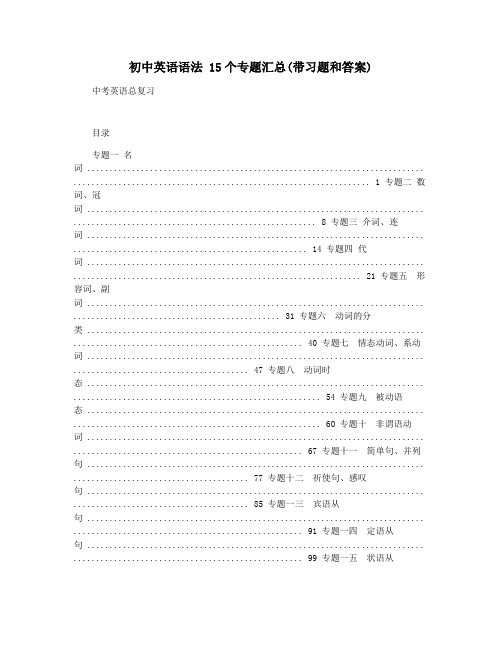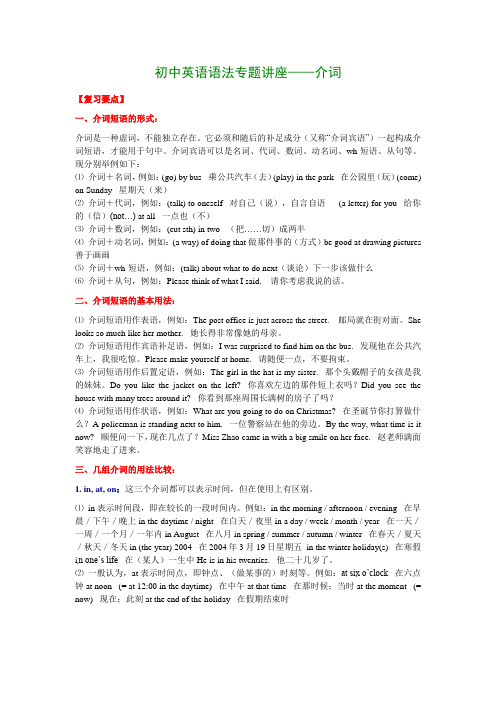2014年中考英语语法总复习
- 格式:pdf
- 大小:222.82 KB
- 文档页数:21

初中英语语法专题讲座——冠词【复习要点】英语的冠词分为三种:不定冠词、定冠词和零冠词(即不用冠词)。
一、不定冠词:英语中不定冠词有两个:a, an。
a用于以辅音音素开头的词前,例如:a room, a red apple, a useful book;an用于元音音素开头的词前,例如:an egg, an old man, an hour。
1、不定冠词的基本用法:不定冠词主要用于泛指和类指,有时也用于特指(如以下第⑵条)。
⑴、表示“一个(one);每一个(each)”,例如:There is a table and four chairs in the room. 房间里有一张餐桌和四张椅子。
He comes to visit me twice a year. 他每年来看我两次。
a和one有时可以互换,例如:There were nearly a / one hundred people at the meeting.有将近100人参加了会议。
但是,在一些习惯用语中,a和one是不可互换的。
例如:once upon a time(从前)和one day (有一天)这两个短语中的a, one就不能互换;an hour or two 和one or two hours(一两个小时)这两个短语中的an, one也不能互换。
请注意:a (an) 虽表示“一个”,但不强调数量,而是强调类别;one则强调数量。
例:I bought a computer. 我买了一台电脑。
(不是收音机和电视机)I bought one computer. 我买了一台电脑。
(不是两台)⑵、表示“某一个(a certain)”,例如:She went to buy a dictionary. 他去买了一本词典。
(没有买别的东西)We used to live in a small house. 我们曾经住在一间小屋子里。
⑶、表示一类中的任何一个,通常不必译成中文。


初中英语语法 15个专题汇总(带习题和答案) 中考英语总复习目录专题一名词 ........................................................................... .................................................................. 1 专题二数词、冠词 ........................................................................... ...................................................... 8 专题三介词、连词 ........................................................................... .................................................... 14 专题四代词 ........................................................................... ................................................................ 21 专题五形容词、副词 ........................................................................... .............................................. 31 专题六动词的分类 ........................................................................... ................................................... 40 专题七情态动词、系动词 ........................................................................... ....................................... 47 专题八动词时态 ........................................................................... ....................................................... 54 专题九被动语态 ........................................................................... ....................................................... 60 专题十非谓语动词 ........................................................................... ................................................... 67 专题十一简单句、并列句 ........................................................................... ....................................... 77 专题十二祈使句、感叹句 ........................................................................... ....................................... 85 专题一三宾语从句 ........................................................................... ................................................... 91 专题一四定语从句 ........................................................................... ................................................... 99 专题一五状语从句 ........................................................................... . (106)专题一名词1. 名词的数1. 概述: 名词按其表示的事物的性质分为可数名词和不可数名词。

中考英语语法总复习讲义专题一名词名词是中考考查的重点。
考查内容主要为:Ⅰ.名词的定义名词是表示人、事物、现象和其他抽象概念的名称的词。
名词可分为专有名词和普通名词。
专有名词是具体的人和事物等特有名称。
专有名词的第一个字母要大写,人名、地名、公共节日及月份、周日的名称等等都是属于专有名词。
如:Yao Ming 姚明;China 中国;Christmas 圣诞节等。
Ⅱ. 可数名词和不可数名词普通名词按照其所表示的事物的性质分为可数名词和不可数名词。
1.可数名词可数名词有单数和复数两种形式。
如:an apple; two apples 。
★注意: a 用于以辅音音素( 指音标) 开头的单数名词前;an 用于以元音音素( 指音标) 开头的单数名词前。
,a red apple , an hour/’aua/ 如:a book/buk/, a useful/ju:sful/ book ,an apple/’aepl/2.不可数名词: 不可数名词包括物质名词和抽象名词,没有复数形式。
(1)物质名词。
如:water; rice; tea; milk; food; fruit; meat; fish(鱼肉); chicken(鸡肉); beef; mutton; orange(橙汁);sugar; salt; paper(纸); porridge; bread; sand; juice等。
这类不可数名词需要计量时要在名词前加表示量的词。
如: a cup of tea; two bags of rice; three bottles of water等。
(2)抽象名词。
如:news; music; time(时间); information等。
(3)不可数名词不能与数词或不定冠词连用。
(4)注意有些名词既可做可数名词也可做不可数名词。
如:fish; time; glass; orange; room; noise; chicken等。

初中英语语法专题讲座——介词【复习要点】一、介词短语的形式:介词是一种虚词,不能独立存在。
它必须和随后的补足成分(又称“介词宾语”)一起构成介词短语,才能用于句中。
介词宾语可以是名词、代词、数词、动名词、wh-短语、从句等。
现分别举例如下:⑴介词+名词,例如:(go) by bus 乘公共汽车(去)(play) in the park 在公园里(玩)(come) on Sunday 星期天(来)⑵介词+代词,例如:(talk) to oneself 对自己(说),自言自语(a letter) for you 给你的(信)(not…) at all 一点也(不)⑶介词+数词,例如:(cut sth) in two (把……切)成两半⑷介词+动名词,例如:(a way) of doing that 做那件事的(方式)be good at drawing pictures 善于画画⑸介词+wh-短语,例如:(talk) about what to do next(谈论)下一步该做什么⑹介词+从句,例如:Please think of what I said. 请你考虑我说的话。
二、介词短语的基本用法:⑴介词短语用作表语,例如:The post office is just across the street. 邮局就在街对面。
She looks so much like her mother. 她长得非常像她的母亲。
⑵介词短语用作宾语补足语,例如:I was surprised to find him on the bus. 发现他在公共汽车上,我很吃惊。
Please make yourself at home. 请随便一点,不要拘束。
⑶介词短语用作后置定语,例如:The girl in the hat is my sister. 那个头戴帽子的女孩是我的妹妹。
Do you like the jacket on the left? 你喜欢左边的那件短上衣吗?Did you see the house with many trees around it? 你看到那座周围长满树的房子了吗?⑷介词短语用作状语,例如:What are you going to do on Christmas? 在圣诞节你打算做什么?A policeman is standing next to him. 一位警察站在他的旁边。

1、词类:英语词类分十种:名词、形容词、代词、数词、冠词、动词、副词、介词、连词、感叹词。
1、名词(n.):表示人、事物、地点或抽象概念的名称。
如:boy, morning, bag, ball, class, orange.2、代词(pron.):主要用来代替名词。
如:who, she, you, it .3、形容词(adj..):表示人或事物的性质或特征。
如:good, right, white, orange .4、数词(num.):表示数目或事物的顺序。
如:one, two, three, first, second, third, fourth.5、动词(v.):表示动作或状态。
如:am, is,are,have,see .6、副词(adv.):修饰动词、形容词或其他副词,说明时间、地点、程度等。
如:now, very, here, often, quietly,slowly.7、冠词(art..):用在名词前,帮助说明名词。
如:a, an, the.8、介词(prep.):表示它后面的名词或代词与其他句子成分的关系。
如in, on, from, above, behind.9、连词(conj.):用来连接词、短语或句子。
如and, but, before .10、感叹词(interj..)表示喜、怒、哀、乐等感情。
如:oh, well, hi, hello.2、句子成分:英语句子成分分为七种:主语、谓语、宾语、定语、状语、表语、宾语补足语。
1、主语是句子所要说的人或事物,回答是“谁”或者“什么”。
通常用名词或代词担任。
如:I’m Miss Green.(我是格林小姐)2、谓语动词说明主语的动作或状态,回答“做(什么)”。
主要由动词担任。
如:Jack cleans the room every day.(杰克每天打扫房间)3、表语在系动词之后,说明主语的身份或特征,回答是“什么”或者“怎么样”。
初中英语语法一.名词名词在句中表示所有关系的语法形式叫做名词所有格。
所有格分两种:一是名词词尾加’s 构成,二是由介词of加名词构成。
前者多表示有生命的东西,后者多表示无生命的东西用于无生命的东西:the legs of the chair, the cover of the book用于有生命的东西,尤其是有较长定语时:the classrooms of the first-year students 用于名词化的词:the struggle of the oppressed二.冠词冠词分为不定冠词(a, an),定冠词(the),和零冠词。
1) one可以泛指任何人,也可特指,复数为ones。
some多用于肯定句,any多用于疑问句和否定句。
One should learn to think of others.Have you any bookmarks? No, I don’t have any bookmarks.I have some questions to ask.2) some可用于疑问句中,表示盼望得到肯定的答复,或者表示建议,请求等。
Would you like some bananas?Could you give me some money?3) some 和any修饰可数名词单数时,some表示某个,any表示任何一个。
I have read this article in some magazine.Please correct the mistakes, if any.4) some和数词连用表示“大约”,any可与比较级连用表示程度。
There are some 3,000 students in this school.Do you feel any better today?2. each和every:each强调个别,代表的数可以是两个或两个以上,而every强调整体,所指的数必须是三个或三个以上。
英语语法定语从句教案【篇一:初中英语语法中考总复习教案—定语从句】 hanbo culture training center test paper for grade 9初中英语语法中考总复习教案—定语从句先行词定语从句一.定义:在复合句中,用来修饰某一名词或代词的从句叫做定语从句。
被定语从句修饰的名词、代词叫先行词。
定语从句放在先行词之后。
i like 先行词(物)↘引导词she is a 先行词(人)↘引导词二.引导词:关系代词:that , which, who, whom, whose关系副词:where, why, when关系代词关系副词①② a. tellb. is telling c. tells先行词总结:㈠从句谓语动词的单复数与_____________的单复数一致,(当引导词充当定语从句的主语时)③ it is the thing ______ i like.a. that b. when c. why④ she is a girl ______ studies well. a. whomb. wherec. which ㈡判断找引导词是关系代词或关系副词,找出定语从句的主谓宾,看缺什么成分。
⑤ i like the music _______ he writes.a. /b. whoc. why㈢that 引导定语从句,充当定语从句的宾语时,可以省略。
三.that与which的区别:that和which一般可互换,但下列情况只用that1. i’m sure she has something ______ you can borrow.a. thatb. which⑴先行词为:all, everything, nothing, something, anything, little, much, few等不定代词时2. i’ve read ⑵先行词被all, every, no, some, any, little, much等修饰时⑶先行词被序数词和最高级修饰时4. this is the only book that belongs to him.⑷先行词被the only, the very, the same, the best, the last等修饰时⑸先行词既有人也有物6. who is the girl ______ spoke to you just now?which is the car ______ was made in china?a. thatb. whoc. which⑹当主句以who或which开头时,定语从句的引导词用that,不用who或which,避免重复3 that不能用于介词后及表示所有的,和非限制性定语从句四.其它的:⑴ who is the man ______ i saw yesterday.who与that都可指人,但前面有who,后面只可用that⑵ this is the house in ______ he lives.a. thatb. whichc. who先行词是物,且介词提前用whichthe school (______ my father works) looks very beautiful.(my father works in the school)a. whichb. in thatc. in which⑶ is this the man with ______ you went to the zoo yesterday?a. whob. whomc. whichhe is a man ( _______ we can learn).a. whomb. from whichc. from whom先行词是人,且介词提前用whom⑷ he lives in a house, _______ has many trees around it.a. thatb. whichc. who先行词(物)与引导词之间有逗号隔开(非限制性定语从句),用which⑸名词a. whichb. whosec. that引导词后面有名词时,引导词用whose⑹ he is a boy(______ is confident.)主语(介词提前)he is the teacher ( ______ you are waiting for.)a. whob. whomc. whose 宾语先行词是人:①引导词在句中作主语,引导词用who②介词提前在句中作宾语,引导词只能用whom③引导词在从句中作宾语,引导词用who/whom⑺this is the factory ________ my father works in.this is the factory in ________ my father works.this is the factory ________ my father works.先行词表示地点时,引导词用where,在句中作状语,where不能作主语。
2014年中考英语语法总复习(精华版)Ⅰ词类。
词类英语名称意义例词名词The Noun (缩写为n) 表示人或事物的名称Basket, mouth, hospital, year, train 冠词The Article (art) 用在名词前帮助说明名词所指的人或事物a, an, the代词The Pronoun (pron) 用来代替名词、形容词或数词They, his, him, mine, which, all 形容词The Adjective (adj) 用以修饰名词,表示人或事物的特征Long, empty, heavy, different, cheap, hungry 数词The Numeral (num) 表示数量或顺序Three, thirteen, twenty, second 动词The Verb (v) 表示动作或状态Hear, write, swim, eat, borrow, sing 副词The Adverb (adv) 修饰动词、形容词或其他副词Quickly, early, out, soon, then, sometimes 介词The Preposition (prep) 表示名词、代词等和句中其他词的关系From, with, at, into, behind, between, for 连词The Conjunction (conj) 用来连接词与词、短语与短语或句与句And, or, but, so, because 感叹词The Interjection (interj) 表示说话时的喜悦、惊讶等情感Oh, hey, ouch, well, there, dear (一) 名词:专有名词:表示人名、月份、日期、地名等。
如China, John, London, the USA, Harbin .个体名词:表示单个的人或事物。
如boat, chair, desk, apple .集体名词:表示一群人或一些事物的总称。
如family, people, class, police . 可数名词普通名词物质名词:表示无法分为个体的物质。
如water, air, tea, sea, money, cotton .抽象名词:表示抽象概念的词。
如health, help, work, friendship . 不可数名词 2.名词的数。
可数名词有单复数,不可数名词没有单复数。
3.名词的格:名词有三个格:主格(作主语)、宾格(作宾语)、和所有格。
其中只有名词的所有格有形式变化。
(二)冠词1.定冠词-the .○1 特指某(些)人或某(些)事物。
The students are very good.○2 说话人与听话人都知道的人或事物。
Where is the toilet ?○3 重复提到上文的人或事物。
I have a cat , the cat is white and black .○4 表示世界上独一无二的事物。
The moon moves around the earth .○5 形容词最高级和序数词前和表示方位的名词前。
I am the oldest . He is the first to school . I live in the south .○6 乐器的名称前常用定冠词-the 。
I like playing the piano / violin .○7 和某些形容词连用,使形容词名词化,代表某一类人。
We should help the poor .○8 放在某些专有名词前。
We will go to visit the Great Wall next week . the people’s Republic of China .○9 放在姓氏的复数形式前,表示全家人或夫妇两人。
The Whites are watching TV .10 固定词组中。
In the morning / afternoon / evening .○2.不定冠词-a / an .○1 指人或事物的某一种类。
A horse is a useful animal. A table has four legs.○2 指某一类人或事物中的任何一个。
Pass me a pencil, please. We write with a pen.○3 指某人或某物,但不具体说明何人或何物。
The book was written by a peasant. Last month we were working in a factory. ○4 不定冠词还可以指“事物的单位”,如“每日”、“每斤”等。
Here is a letter for you . The meat is 18 yuan a kilo.3.零冠词。
○1 泛指人类或男女。
Man will conquer nature .○2 抽象名词在用来表示它的一般概念时,通常不加冠词。
Knowledge begins with practice .○3 有些个体名词有时可以转化成具有抽象意义,其前面也常不加冠词。
We had better send him to hospital at once.○4 在专有名词前一般不用冠词。
China is a great country. Mr Smith is an artist.○5 在三餐饭何球类运动名称之前不用冠词。
He often goes out for a walk after supper. Sometimes I play basketball.○6 在节假日、星期几、月份、季节等名词前。
October 10th is Teachers’ Day.○7 称呼语或表示头衔、职务的名词前不用冠词。
Granny is sleeping now. We call him monitor.○8 在语言名词前,名词前有指示代词、物主代词或数词时,不用冠词。
This is his book. I can speak English .○9 不用冠词的惯用语。
At night / on food / go to town / at home / in class / at work 等。
(三)形容词1.形容词的构成。
○1简单形容词由一个单词构成。
Good, long, green, large, bright, interesting, surprised, learned, developing, sleeping .○2复合形容词由一个以上的词构成。
20-minute, second-hand, 500-word, 8-year-old, three-legged, round-trip, part-time, good-looking.2.形容词的用法。
○1修饰名词作定语。
She is a beautiful girl .○2作表语。
He is very strong.○3作宾语补足语。
Let the door open. You must keep your classroom clean .○4“定冠词+形容词”表示一类人或物,在句子中可作主语或宾语。
We should speak to the old politely.○5大多数形容词既可作表语又可作定语,但少数形容词只能作表语,不能作定语。
如:asleep, ill, awake 等。
○6有些形容词只能作定语而不能作表语。
如:many, little, wooden, golden 等。
3.形容词的位置。
○1形容词通常放在它所修饰的名词的前面。
A heavy box.○2与表示度量的词连用,形容词要放在它所修饰词语的后面。
3 metre long. 12 kilometer away .○3与不定代词something, anything, everything, nothing 等连用时,可以放在这些词之后。
Something important . nothing serious .○4当名词前有多个形容词修饰时,一般按下面的词序排列:冠词(包括物主代词、序数词、基数词)-描述形容词(brave, beautiful)-表示形状(大小、长短、高矮)的形容词-表示年龄或新旧的形容词-表示颜色的形容词-表示国籍、出处或来源的形容词-表示材料、物质的形容词-表示用途或类别的形容词-被修饰的词。
My nice small brown leather bag . those large round black wooden tables .4.形容词的比较级和最高级。
(一般加er / est ,不规则见表)○1原级的用法:“……和……相同”A.肯定句:A +动词+as +形容词原级+as +B . He is as tall as me .B.否定句:A…+not as +形容词原级+as +B (即A 不如B 那么…)A…+not so +形容词原级+as +B = A…+ less + 形容词原级+than + B .○2比较级的用法:A. A +动词+形容词的比较级+than +B . (A 比B 更…,在这种句型中,比较级前面可用much, even, still, a little, a bit, a lot, any, far 等修饰,表示“…得多”,“甚至…”,“更…”,“…一点儿”。
B.“比较级+and +比较级”、“more and more +部分双音节或多音节的原级”译为“越来越…”。
○3最高级的用法:(个体用-of ,范围用-in,最高级前面要用定冠词-the)A.三种最高级表示法。
最高级:Shanghai is the largest city in China .比较级:Shanghai is larger than any other city in China . / Shanghai is larger than the other cities in China .原级:No other city is as large as Shanghai in China . / No other city is larger than Shanghai in China .(四)副词1.副词的种类:○1时间副词:often, always, usually, early, ago, already, before, ever, late, now, soon, since, tomorrow, just now …○2地点副词:here, there, above, below, outside, anywhere, back, down, home, out, everywhere …○3方式副词:hard, well, badly, fast, slowly, angrily, simply, carefully …○4 程度副词:very, quite, much, still, almost, little, too, enough …○5 疑问副词:how, when, where, why …○6 关系副词:when, where, why … (引导定语从句)○7 连接副词:how, when, where, why, whether …○8 频率副词:often, seldom, usually, never, sometimes, every day, always, hardly …○9 其他副词:really, certainly, surely, maybe …2.副词的用法:○1 作状语 : He can finish the work easily .○2 作定语(要后置) : The students here are from Harbin .○3 作表语 : I must be off now .○4 作宾补,构成复合宾语 : Show him up . I saw him out with my sister last night .3.副词的比较级和最高级。